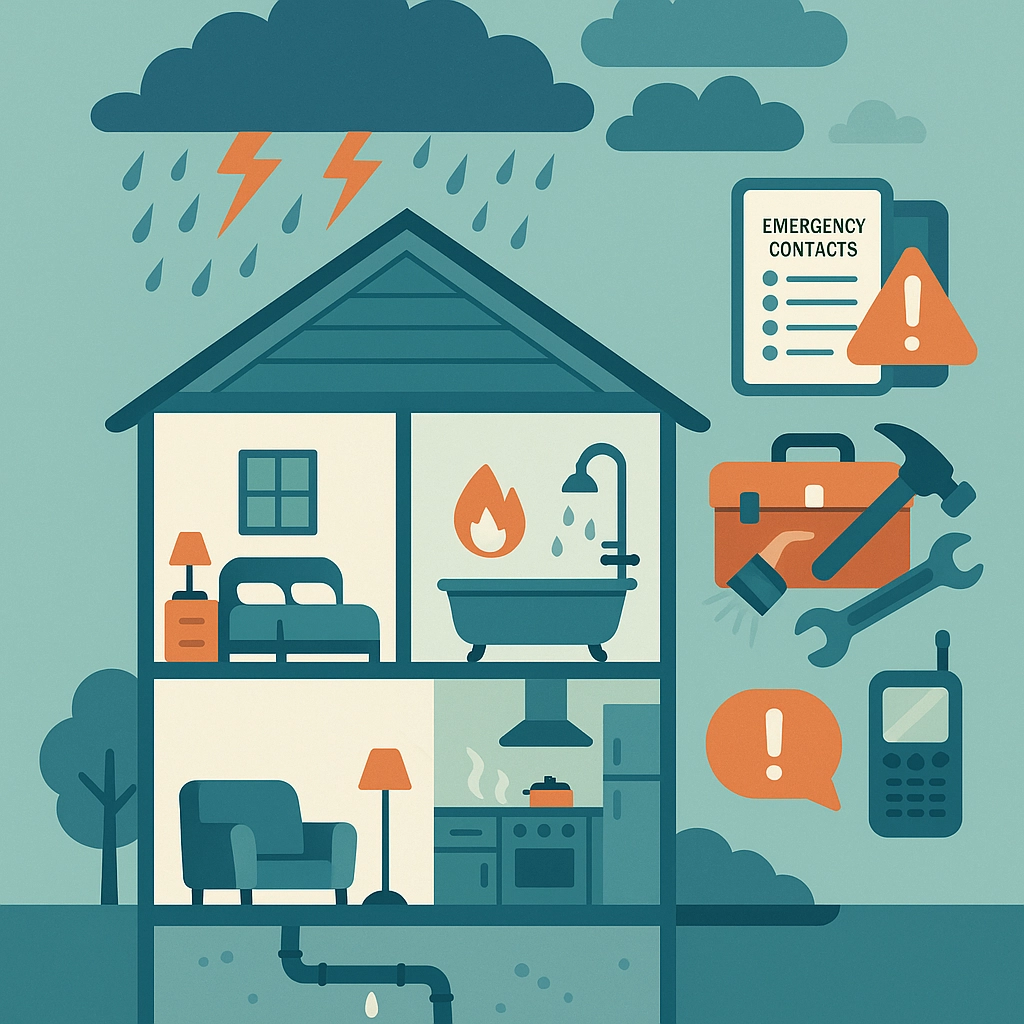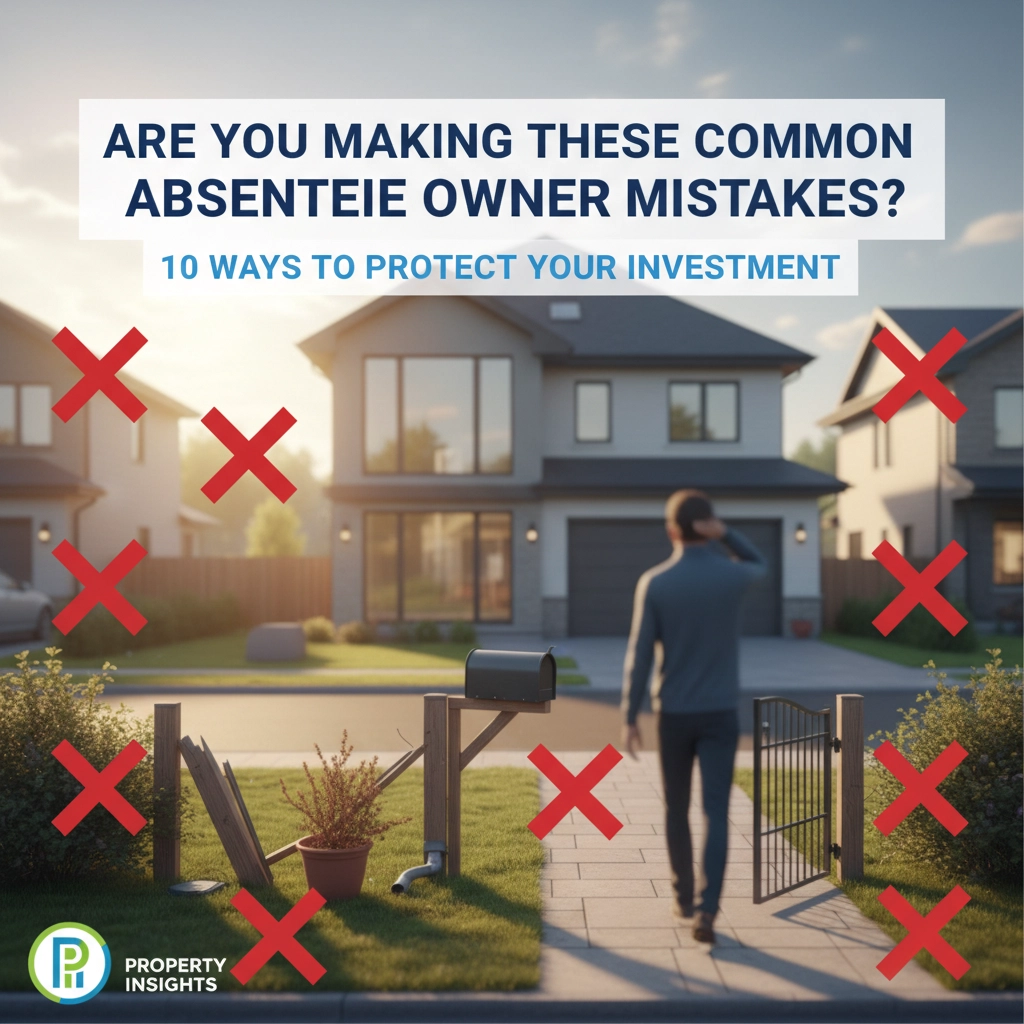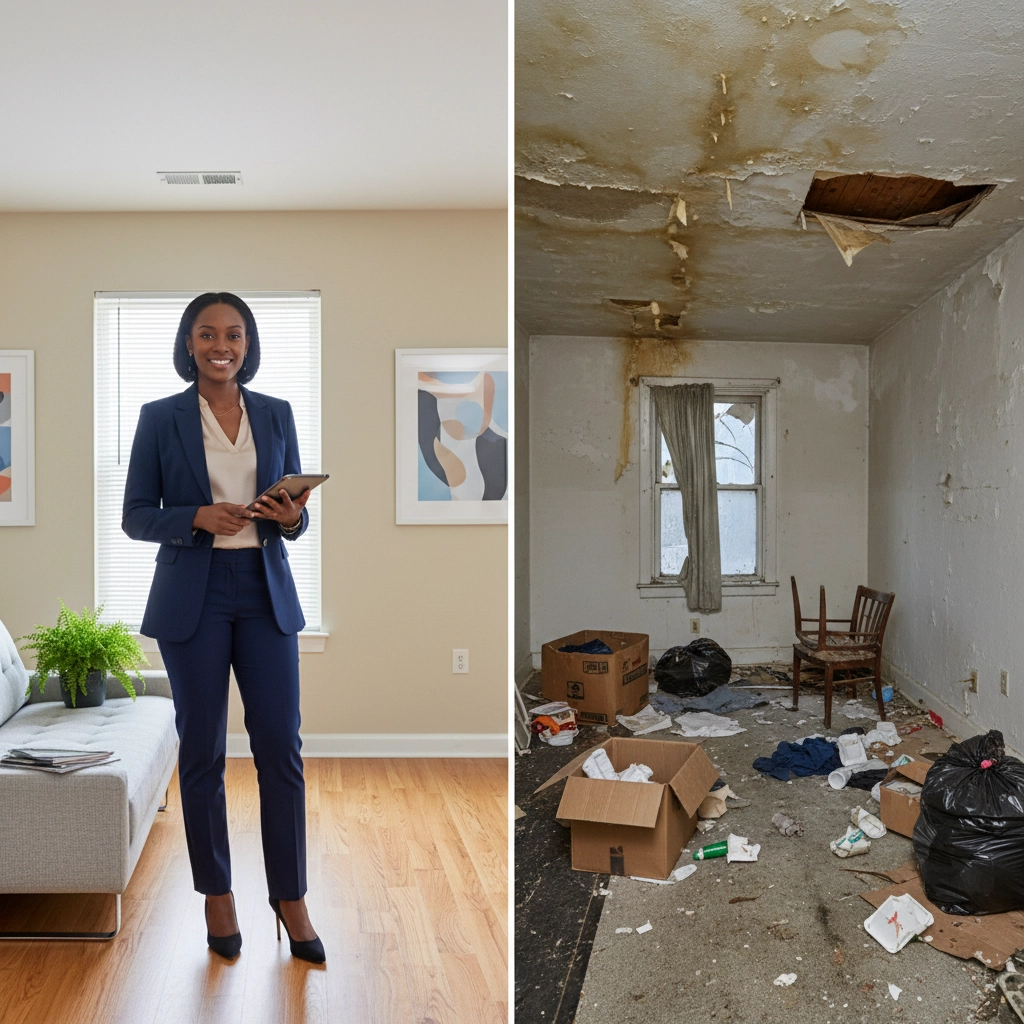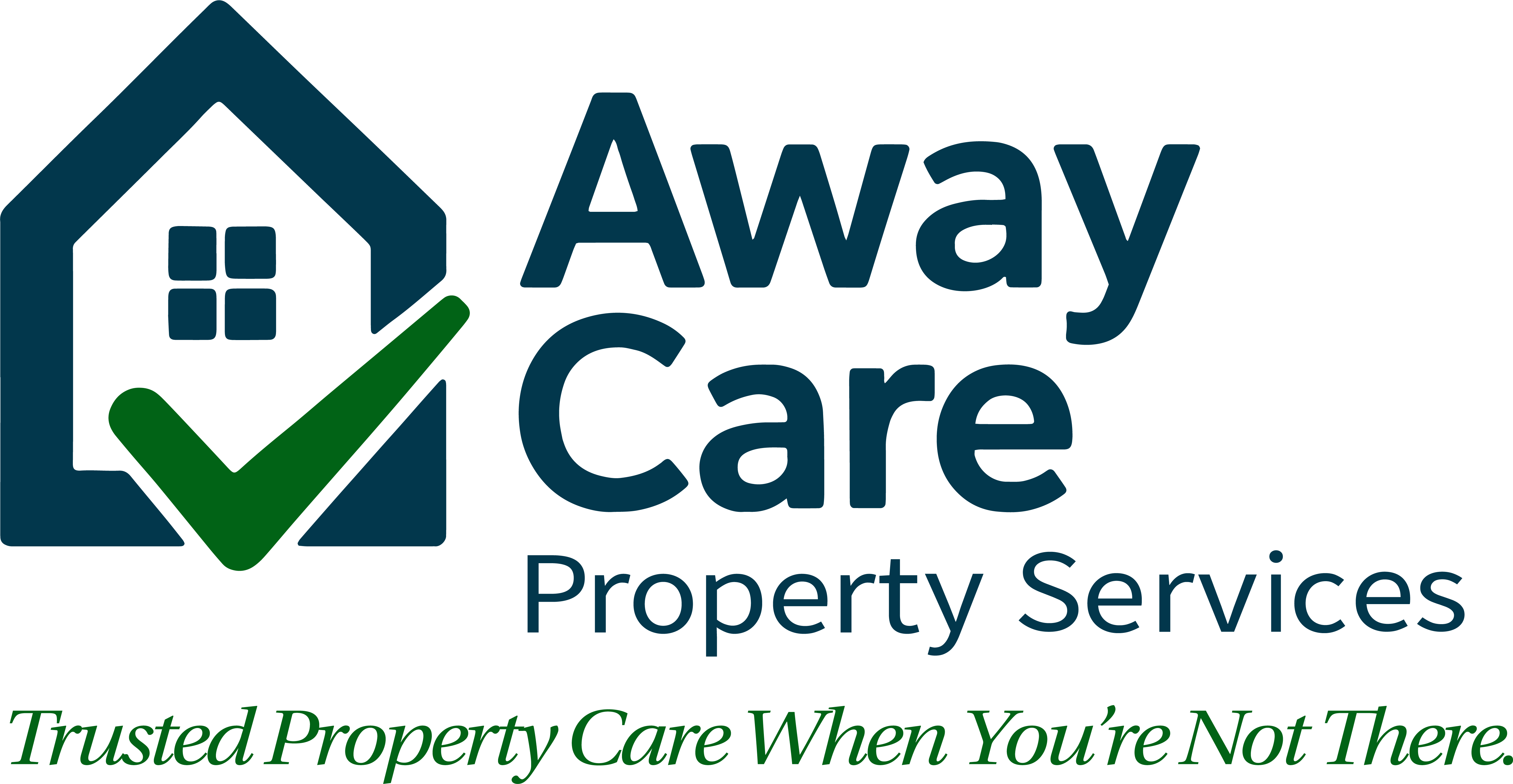-
Stop Worrying About Your Investment Property: 5 Steps to Complete Peace of Mind

Owning an investment property shouldn't feel like carrying a constant weight on your shoulders. Whether you live across town or across the country from your rental, the nagging worry about what might be going wrong can steal your sleep and drain your energy.
The good news? You can transform your investment property from a source of stress into a reliable, hands-off income stream. It all comes down to having the right systems in place. Here are five essential steps that'll help you stop worrying and start enjoying the benefits of property ownership.
Step 1: Set Up Professional Property Monitoring
The biggest source of property-related anxiety comes from the unknown. When you can't physically check on your investment, your mind starts filling in the blanks: and rarely with good scenarios. That's where professional property monitoring becomes your peace-of-mind game-changer.
Regular property inspections catch small issues before they become expensive disasters. A minor roof leak detected early might cost $200 to fix, but left unnoticed for months? You're looking at thousands in water damage, mold remediation, and tenant displacement costs.

Professional monitoring services provide detailed photo and video documentation of your property's condition, giving you eyes on the ground when you can't be there yourself. They check for signs of water damage, pest issues, security concerns, and general maintenance needs. This systematic approach means nothing slips through the cracks.
The key is choosing a monitoring service that understands investment properties specifically. They should know what to look for, how to communicate findings clearly, and when to escalate urgent issues that need immediate attention.
Step 2: Create Emergency Preparedness & Response Plans
Nothing creates anxiety like feeling unprepared for the unexpected. Whether it's a burst pipe, storm damage, or a late-night emergency call from tenants, having detailed response plans removes the panic from these situations.
Start by identifying potential risks specific to your property and location. If you're in Florida, hurricane preparation is crucial. Properties in cold climates need freeze protection plans. Areas prone to wildfires require evacuation procedures.

Your emergency plan should include:
- Contact information for trusted local contractors and service providers
- Step-by-step procedures for common emergencies
- Clear communication protocols with tenants
- Backup plans for when your primary contractors aren't available
Document everything and make sure all stakeholders—property managers, tenants, and monitoring services—have access to these plans. When emergencies happen (and they will), you'll respond calmly instead of scrambling.
Consider establishing relationships with multiple vendors before you need them. Having pre-vetted contractors for plumbing, electrical, HVAC, and general repairs means faster response times and often better pricing when emergencies strike.
Step 3: Implement Regular Maintenance & Inspection Systems
Reactive maintenance is expensive and stressful. Proactive maintenance is neither. The difference between these approaches can mean the difference between peaceful property ownership and constant crisis management.
Create a comprehensive maintenance schedule that covers all major systems and components. HVAC systems need regular filter changes and seasonal check-ups. Gutters require cleaning and inspection. Appliances need routine servicing to prevent breakdowns.

Don't rely on tenants to report maintenance issues promptly—or at all. Many tenants, especially good long-term ones, don't want to "bother" their landlord with minor issues. Unfortunately, minor issues rarely stay minor without attention.
Regular professional inspections catch these problems early. A qualified inspector can spot the warning signs of electrical issues, plumbing problems, structural concerns, and other expensive repairs before they require emergency intervention.
Track all maintenance activities and costs. This documentation helps you spot patterns (like recurring HVAC issues that might indicate a larger problem) and provides valuable information for tax purposes and future property decisions.
Step 4: Build Financial Protection Strategies
Money worries amplify every other property-related concern. When you're financially prepared for the inevitable costs of property ownership, you can handle challenges with confidence instead of panic.
Start with a robust emergency fund specifically for your investment property. Experts recommend maintaining 3-6 months of mortgage payments plus potential repair costs. This might seem like a lot, but consider the alternative: being forced to sell quickly or take on high-interest debt when problems arise.

Proper insurance coverage is non-negotiable. Landlord insurance should cover property damage, loss of rental income, and liability protection. Don't assume your regular homeowner's policy covers rental properties: it doesn't.
Consider umbrella insurance for additional liability protection, especially if you own multiple properties. The extra coverage costs relatively little but protects your entire net worth from potential lawsuits.
Review your insurance annually and adjust coverage as property values change. Many property owners discover they're underinsured only after filing a claim. Regular reviews ensure your coverage keeps pace with your property's current replacement cost.
Step 5: Build Your Professional Support Network
Trying to handle everything yourself isn't just stressful: it's often counterproductive. The most successful and peaceful property owners understand the value of building a strong professional network.
Your support network should include trusted contractors for major systems (plumbing, electrical, HVAC), a reliable property management company if you're using one, legal counsel familiar with landlord-tenant law, and an accountant who understands real estate investments.
Consider partnering with a comprehensive property care service that can coordinate between different vendors and provide regular monitoring. This single point of contact eliminates the need to manage multiple relationships while ensuring consistent care for your investment.

Communication is crucial in any support network. Establish clear expectations about response times, reporting procedures, and decision-making authority. Everyone should understand when they can act independently and when they need to contact you first.
Regular check-ins with your network help maintain relationships and ensure everyone stays informed about your property's condition and any ongoing concerns. These relationships often prove invaluable during emergencies when you need trusted professionals to act quickly.
Your Path to Peaceful Property Ownership
Implementing these five steps transforms investment property ownership from a source of constant worry into a reliable, manageable asset. The key is being proactive rather than reactive: putting systems in place before you need them, not after problems arise.
Remember, the goal isn't to eliminate every possible risk (that's impossible), but to create multiple layers of protection that catch issues early and provide clear pathways for resolution when challenges occur.
Professional property monitoring services like AwayCare Property Services specialize in providing the peace of mind that comes from knowing your investment is being watched over by experienced professionals. When you have trusted eyes on your property and systems in place for every scenario, you can finally stop worrying and start enjoying the benefits of property ownership.
The investment in proper systems and professional support pays for itself through prevented disasters, maintained property values, and—perhaps most importantly—your peace of mind. Your investment property should work for you, not against you.
-
Are You Making These Common Absentee Owner Mistakes? 10 Ways to Protect Your Investment

Owning rental property from a distance can be incredibly rewarding, but it's also full of potential pitfalls. When you're not physically present to oversee your investment, small problems can quickly spiral into expensive disasters. The good news? Most absentee owner mistakes are completely preventable once you know what to watch for.
Whether you're managing a vacation rental, inherited property, or investment home in another city, avoiding these common mistakes will protect your investment and save you thousands in the long run.
Mistake #1: Neglecting Maintenance and Repair Issues
The biggest mistake absentee landlords make is ignoring or delaying maintenance requests. When you can't see the property regularly, it's easy to put off that "small" leak or dismiss tenant complaints as minor issues. But here's the reality: a rental unit that isn't properly maintained leads to bigger, costlier repairs down the road.
That leaky faucet your tenant mentioned? If left unchecked, it can cause water damage, mold growth, and structural problems that cost thousands to fix. Meanwhile, your frustrated tenant might break their lease or leave negative reviews that hurt future rentals.
The Fix: Establish a system for handling maintenance requests quickly. Set up multiple ways for tenants to contact you (phone, email, online portal) and respond within 24-48 hours. For urgent issues like water leaks or heating problems, have a local contractor on speed dial who can assess the situation immediately.
Consider scheduling quarterly property inspections to catch problems before tenants even notice them. This proactive approach saves money and keeps tenants happy.

Mistake #2: Inadequate Tenant Screening
When you're eager to fill a vacancy and start collecting rent, it's tempting to rush through tenant screening. This is especially true for absentee owners who can't easily show the property multiple times. But cutting corners on screening is one of the most expensive mistakes you can make.
A problem tenant can cost you months of lost rent, property damage, legal fees, and the stress of eviction proceedings, all while you're trying to manage from hundreds of miles away.
The Fix: Never skip proper tenant screening, no matter how urgent the vacancy feels. Verify employment and income, check credit scores, contact previous landlords, and run background checks. Look for red flags like frequent moves, unexplained gaps in rental history, or reluctance to provide references.
Consider using a property management company if you can't effectively screen tenants yourself. The cost of professional management is often less than the cost of one bad tenant.
Mistake #3: Insufficient Insurance Coverage
Standard homeowner's insurance doesn't cover rental properties. Many absentee owners discover this the hard way when they file a claim and get denied. Without proper coverage, you're personally liable for property damage, injuries that occur on your property, and loss of rental income.
The Fix: Purchase landlord insurance that covers property damage, liability, and loss of rental income. Consider umbrella insurance for additional liability protection, especially if your net worth exceeds your policy limits.
Review your coverage annually and adjust it as property values change. Make sure you understand what's covered and what isn't, some policies exclude certain types of damage like floods or earthquakes that require separate coverage.

Mistake #4: Poor Communication with Tenants
Communication challenges multiply when you're managing from a distance. Tenants need to know how to reach you, when you'll respond, and what to do in emergencies. Poor communication leads to frustrated tenants, unresolved problems, and higher turnover.
The Fix: Set clear communication expectations from day one. Provide multiple contact methods and specify response times for different types of issues. Let tenants know who to contact for emergencies when you're not available.
Use technology to your advantage, property management apps, email systems, and video calls can help you stay connected despite the distance. Regular check-ins with tenants can prevent small issues from becoming big problems.
Mistake #5: Trying to Manage Everything Yourself
Many absentee owners try to handle everything themselves to save money on management fees. While this might work for nearby properties, remote management requires more time and creates more stress than most owners anticipate.
You'll find yourself coordinating repairs from afar, screening tenants over the phone, and losing sleep over every maintenance call. This approach often leads to delayed responses, poor decision-making, and burnout.
The Fix: Consider hiring a local property management company, especially for properties more than a few hours' drive away. Yes, management fees reduce your cash flow, but professional management often pays for itself through better tenant retention, faster repairs, and reduced vacancies.
If full management isn't in your budget, consider hiring help for specific tasks like tenant screening, maintenance coordination, or regular property inspections.
Mistake #6: Failing to Establish Clear Financial Systems
Without proper financial systems, it's easy to lose track of income and expenses, miss late payments, or struggle with tax preparation. Many absentee owners rely on informal arrangements that create problems down the road.
The Fix: Set up professional systems from the start. Use online rent collection services, maintain separate business accounts for rental income and expenses, and track everything digitally. Establish clear policies for late payments, including fees and consequences.
Consider hiring a local accountant familiar with rental property taxes. They can help you maximize deductions and stay compliant with tax requirements in your property's jurisdiction.

Mistake #7: Overlooking Security and Liability Risks
Vacant or poorly monitored properties attract unwanted attention. Absentee-owned properties face higher risks of break-ins, vandalism, squatting, and liability issues. Without regular oversight, these problems can escalate quickly.
The Fix: Implement security measures appropriate for your property and location. This might include security cameras, motion-activated lighting, regular maintenance to avoid the "abandoned" look, and relationships with trusted neighbors who can keep an eye on things.
Make sure your liability insurance covers you for injuries that might occur on your property, even when you're not there. Consider requiring renters insurance from tenants to provide additional protection.
Mistake #8: Neglecting Regular Property Inspections
Even with good tenants, properties need regular inspections to catch maintenance issues, ensure lease compliance, and maintain your investment's value. Many absentee owners skip inspections to save money or avoid inconveniencing tenants, but this shortsighted approach often backfires.
The Fix: Schedule regular inspections at least twice a year, with additional checks after major weather events or when tenants move out. Document everything with photos and detailed notes.
If you can't inspect the property yourself, hire a local service to handle inspections for you. Professional property monitoring services like AwayCare Property Services specialize in providing detailed inspection reports for absentee owners, giving you peace of mind and protecting your investment.
Mistake #9: Inadequate Emergency Planning
Emergencies don't wait for convenient times, and they're especially challenging when you're managing from a distance. Without proper emergency plans, you'll find yourself scrambling to find contractors at 2 AM or dealing with angry tenants who can't get help when they need it.
The Fix: Create detailed emergency procedures before you need them. Identify reliable local contractors for common emergencies like plumbing, electrical, and HVAC issues. Give tenants clear instructions about what constitutes an emergency and who to call.
Consider giving trusted contractors permission to handle emergencies up to a certain dollar amount without prior approval. This ensures faster response times and happier tenants.

Mistake #10: Ignoring Local Laws and Regulations
Landlord-tenant laws vary significantly by location, and ignorance isn't a legal defense. Many absentee owners assume they can manage their property the same way regardless of location, but this approach can lead to expensive legal problems.
The Fix: Research local landlord-tenant laws before renting your property. Understand requirements for security deposits, lease terminations, eviction procedures, and required disclosures. Consider consulting with a local attorney who specializes in landlord-tenant law.
Join local real estate investor groups or landlord associations to stay informed about changing regulations and connect with other property owners in your area.
Protecting Your Investment
Successful absentee ownership requires more planning and systems than local property management, but it's absolutely achievable with the right approach. The key is being proactive rather than reactive: setting up systems and relationships before you need them, not after problems arise.
Consider partnering with professional services that specialize in absentee property care. Companies like AwayCare Property Services provide regular monitoring, detailed reporting, and local expertise that gives you the peace of mind to enjoy your investment from anywhere.
Remember, the goal isn't to eliminate every possible risk (that's impossible), but to create multiple layers of protection that catch issues early and provide clear solutions when challenges occur. Your rental property should work for you, not against you: and avoiding these common mistakes will help ensure it does exactly that.


